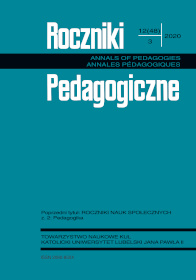Self-Assessment of Paternity in Men Raising Children with Impaired Hearing. Part II. Empirical Research
Main Article Content
Abstract
Paternity to a deaf child is a big challenge, while the attention of researchers and practitioners focuses mainly on the experiences and role of the mother. Therefore, the increasing number of scientific reports on the experiences of the father in this situation, his paternal role and the importance of his involvement in the upbringing of the child should be noted with appreciation. The article presents the results of 14 fathers’ research by means of a diagnostic survey using a self-assessment questionnaire and M. Ziemska’s Parents’ Questionnaire. On the basis of the research results it can be concluded that fathers of deaf children understand paternity as a responsibility for the child and a duty to meet its needs; they evaluate themselves as good fathers; most of them try to support the development of their child by participating in its everyday activities, rehabilitation, important life events and instilling the hierarchy of values, but they attribute to their wife a much greater role in the child’s everyday life and in supporting it emotionally; they perceive their child with hearing loss as independent, yet in need of more care and attention than a child with hearing loss; fathers differ in parental attitudes, some adopt an attitude of over-abundance, control and helplessness, half of them with an attitude of distance. Undoubtedly, fathers, like the rest of the family (or rather the family as a system), require various forms of help and support, including psychological support.
Article Details
References
Bulicz, K. (2015). Postawy ojców słyszących wobec wspomagania rozwoju ich dziecka z uszkodzonym słuchem. Praca magisterska, KUL, promotor: D. Kornas-Biela.
Gałkowski, T. Kunicka-Kaiser, I., Smoleńska J. (1978). Psychologia dziecka głuchego. Warszawa: PWN.
Gałkowski, T., Grossman, J., Skórzak, B. (1966). Réactions émotionelles des enfants infirmes et l’attitude des parents. Psychotherapy and Psychosomatics, 14, 180-185.
Gembal, A. (2001). Analiza postaw rodzicielskich ojców dzieci niesłyszących. Praca dyplomowa. Podyplomowe Studium Surdopedagogiki KUL, promotor: D. Kornas-Biela.
Karwowska, M. (2009). Ojcostwo w samoocenie mężczyzn wychowujących dziecko niepełnosprawne. W: M. Bielska-Łach (red). Pedagogika specjalna: różne poszukiwania – wspólna misja (s. 359-371). Warszawa: Wydawnictwo Akademii Pedagogiki Specjalnej im. Marii Grzegorzewskiej.
Klaczak, M. (1996). Rola rodziców dzieci z wadą słuchu w ich wczesnej rehabilitacji. W: R. Ossowski (red.), Trudności w komunikowaniu się osób z uszkodzonym słuchem. Socjalizacja i rehabilitacja (s. 201-211). Bydgoszcz, Wyższa Szkoła Pedagogiczna w Bydgoszczy.
Kobosko, J. (2009). Relacja matka – dziecko a zaburzenia rozwoju językowego u młodzieży głuchej. Przegląd Psychologiczny, 52(3), 327-342.
Kobosko, J. (2011). Pomoc psychologiczna słyszącym rodzicom a efektywność rehabilitacji dzieci głuchych. Otorynolaryngologia, 10(1), 8-14.
Kobosko, J. (2013). Depresja matek i ojców a głuchota dziecka. Znaczenie satysfakcji małżeńskiej jako predyktora nasilenia doświadczanych przez rodziców objawów depresji. Roczniki Pedagogiczne, 5(41), 3, 123-140.
Kobosko, J. (2014). Problemy zdrowia psychicznego matek i ojców dzieci głuchych z implantem ślimakowym. Otolaryngologia Polska, 68(3), 135-142.
Kornas-Biela, D. (2001). Rodzice wobec diagnozy uszkodzenia słuchu u dziecka: doświadczenia rodziców, pomoc profesjonalistów. W: D. Kornas-Biela (red.), Rodzina: źródło życia i szkoła miłości (s. 459-477). Lublin: Towarzystwo Naukowe KUL.
Kornas-Biela, D. (2016). Rola ojca we wspomaganiu rozwoju dziecka z uszkodzonym słuchem. W: E. Domagała-Zyśk, A. Borowiec, R. Kołodziejczyk (red.), Język i wychowanie. Księga jubileuszowa z okazji 45-lecia pracy naukowej Profesor Kazimiery Krakowiak (s. 306-320). Lublin: Wydawnictwo KUL.
Marcinkowska, J. (2009). Rozwój dziecka głuchego. W: M. Kowalska (red.), Moje głuche dziecko. Kompendium wiedzy na temat rehabilitacji dziecka głuchego (s. 29-35). Łódź: Polski Związek Głuchych/Oddział Łódzki.
Trębicka-Postrzygacz, B. (1999). Dziecko niesłyszące w rodzinie. Audiofonologia, 14, 93-101.
Zaidman-Zait, A., Most, T., Tarrasch, R., Haddad-eid, E., Brand D. (2016). The impact of childhood hearing loss on the family: Mothers’ and fathers’ stress and coping resources. The Journal of Deaf Studies and Deaf Education, 21(1), 23-33. DOI: 10.1093/deafed/env038.
Ziemska, M. (1973). Postawy rodzicielskie. Warszawa: Wiedza Powszechna.
Ziemska, M. (1981). Kwestionariusz dla rodziców do badania postaw rodzicielskich: podręcznik tymczasowy. Warszawa: Państwowe Wydawnictwo Naukowe.

